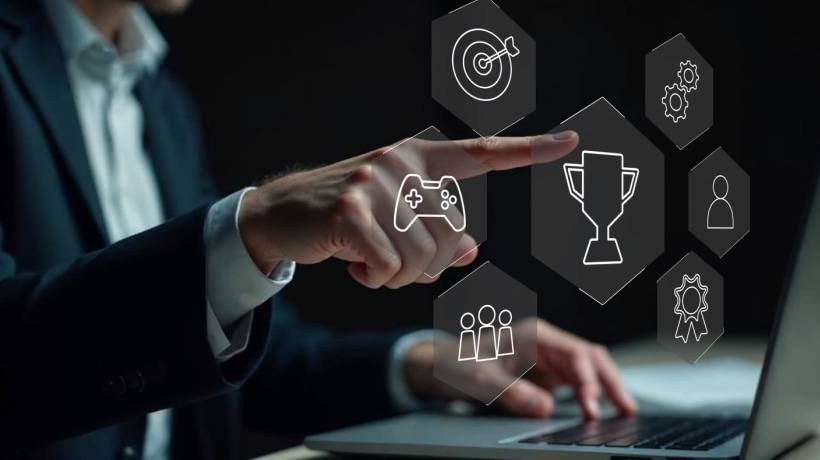How To Teach And Reinforce Quick Decision Making With Games
"Think fast".
That familiar phrase is often followed by something being hurled at someone who must quickly take action or suffer the consequence. Although this phrase is most commonly found on the playground, the concept is all too familiar to the business world. The combination of a fast-paced modern workplace, ever-changing projects, and new client expectations, coupled with instant communication, means that business requires individuals to think fast. However, with this pressure to make quick decisions comes the responsibility to accurately understand a situation in its entirety in order to provide an effective solution. The consequences of these quick decisions could cost millions of dollars and hundreds of hours to solve, so it is pertinent that employees learn how to fully assess situations and make decisions as quickly as possible to run an effective business.
Playing games is a solution to this problem. Games have an environment that evolves and poses new problems and obstacles in real time which an individual must solve quickly in order to progress. To do this effectively, an individual must not only understand the mechanics and environment of the game as a whole, but also particulars of this situation, and how both interact with one another. Studies show that people who play action-based video games make more accurate decisions 25% faster. This is because video games create safe situations where players are forced to generate quick and effective solutions to a variety of problem scenarios. By continuously synthesizing the information from their environment and quickly forming solutions, players are able to hone their fast decision-making skills from video games and apply the concepts they have learned to the workplace.
Feedback From Games In Real Time
Feedback from games offers a unique, real-time learning experience that can be immediately applied by the player to adjust their future actions. Learning the correct way to perform an action or task is crucial; games provide an opportunity to not only learn in the form of rewards or information blurbs but also an opportunity to immediately correct their action. There is no doubt in the player's mind if they can remember or correctly apply the concept they have just learned because they are able to act upon it as soon as they receive feedback. This style of failure, learning, and immediately performing the correct action drives information into a player’s long-term memory so that they can continue to apply their knowledge in future scenarios.
An example of this real-time feedback, learning, and application of action, can be seen in the financial decisions in MassMutual Foundation Inc.’s companion app called FutureSmart. In each level, users are provided with different financial scenarios where they have to decide what they want to do with their money. For every decision made, the game offers feedback on how users are doing in real time. Since these scenarios provide multifaceted financial decisions, a player can apply what they recently learned from one purchase to another and put into action the feedback he or she had just received. This teaches users how to make decisions by displaying the consequences of their decisions as they make them. It provides a risk-free environment where individuals are able to make financial decisions which they can apply to their day to day lives.
FutureSmart began as an initiative to educate younger students on financial responsibility throughout different periods of their lives. Educators found that games provided a fun and engaging medium for middle school audiences by introducing new concepts through the familiar platform of games. Games like FutureSmart are helping children instill important decision-making skills so that they can apply them effectively in the future.
Training Games That Aid In Quick Decision-Making
The ability to quickly understand a situation in its entirety and make an accurate decision is pivotal in the medical field. Bridge2care is a program created to help healthcare professionals made quick, accurate judgments and decisions when dealing with patients recently diagnosed with HIV. The module-based program is self-directed and it teaches healthcare professionals the skills they need to help them communicate and engage with as well as care for a patient.
This game-based training provides not only effective results but also confidence that can only be achieved through trying and failing. Bridge2care is full of virtual scenarios where players apply their understanding of situations to solve problems for points and badges. Users experience similar situations with slight alterations so that they can apply the knowledge learned from their last encounter to the new information they were presented to make an effective decision. The information and skills they learn throughout this program caused 93% of users to report that they felt more prepared to apply the knowledge they learned to their work.
Businesses outside of the medical field often look to improve games to help employees sharpen their decision-making skills through a variety of scenarios that focus on listening. For example, one person will say a sentence that starts a story then another person will continue the story by adding another sentence and so on. However, the catch is for each subsequent person to start their sentence with the same letter that the last sentence ended with. Therefore, players have to listen very carefully to the words while paying attention to the greater story forming too quickly decide on a word that is both relevant to the game and that can continue the story. This not only provides an opportunity for practice and utilize their listening skills but also teaches customer service employees how to build rapport with the customers.
Games that train employees in quick decision-making are a necessary investment for companies and educational institutions who are looking to instill this skillset. The ability to make the right decisions quickly and clearly is crucial in a work environment and, if a company’s employees are trained and prepared to do so, can make a world of difference in the company’s productivity.








